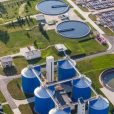Australian pharmaceutical company Amplia Therapeutics (ASX: ATX) is conducting a clinical trial—the ACCENT trial—for pancreatic cancer. The trial will test a new drug called narmafotinib in combination with standard chemotherapy. Narmafotinib targets a protein called FAK (Focal Adhesion Kinase), which is becoming a hot area of research in cancer treatment. Amplia’s drug aims to make tumours more susceptible to existing therapies.
The Phase 1b/2a trial tests narmafotinib in combination with standard-of-care chemotherapy gemcitabine and Abraxane® in first-line patients with advanced pancreatic cancer.
Amplia CEO and Managing Director, Dr Chris Burns said, “The clinical responses we are seeing in patients from the Phase 1b stage is very promising. The duration of trial, given the aggressiveness of the disease in these patients, is also extremely encouraging.
“As reported at the end of our Phase 1b trial, the drug safety and tolerability also appears to be very acceptable for this patient group. We look forward to reporting on further data from the trial as the Phase 2a patients are assessed.”
Amplia Therapeutics is an Australian pharmaceutical company advancing a pipeline of FAK inhibitors for cancer and fibrosis. FAK is an increasingly important target in cancer, and Amplia focuses on fibrotic cancers such as pancreatic and ovarian cancer.
The ACCENT trial is a two-part study designed to test a drug called AMP945, i.e. narmafotinib, in combination with standard chemotherapy for pancreatic cancer. The first part (Phase 1b) figured out the best dose of AMP945 by looking at safety, side effects, how the drug behaves in the body, and early signs of effectiveness. The second part (Phase 2a) focuses on how well AMP945 works alongside the standard chemo drugs.
The initial safety trial dosed 14 patients and identified a safe dosage. Seven patients remained on the trial for over six months, exceeding the typical timeline for pancreatic cancer patients on standard treatments. The initial results showed a positive response, with six patients experiencing a partial response and eight having stable disease. These results are better than what’s typically seen with standard treatments alone. Three patients from this first phase are still being monitored in the ongoing trial.
The Phase 2a trial will initially enrol 26 patients over the coming months. Recruitment into this next trial stage is progressing well, with patients recruited through six trial sites in Australia and five trial sites in South Korea. Currently, eleven patients have been recruited: seven in Australia and four in Korea.
The main goals are to see how many patients respond to treatment and how long they stay on the trial. An interim efficacy analysis will then be conducted around Q3 CY24. An efficacy assessment showing six or more partial or complete responses out of the 26 patients will be sufficient to continue the trial. An additional 24 patients will then be enrolled, for a total of 50 patients.
Amplia finished the prior quarter with cash of $3.9 million, down from the September quarter’s $5.7 million. Plus, as its pancreatic cancer trial in Australia progresses, it has also received US FDA clearance for its Investigational New Drug (IND) Application for a clinical trial of narmafotinib in the USA. The proposed trial would explore the combination of narmafotinib and FOLFIRINOX in advanced pancreatic cancer patients in the USA.
- Ovanti’s iSentric signs contracts worth $14.4m with Malaysian commercial bank - June 27, 2024
- Baby Bunting fights back from retail downturn with 5-year strategy, includes Gen-Z focus and self-funded growth - June 27, 2024
- CLEO meets with US FDA to develop strategy for ovarian cancer test launch - June 26, 2024













1 Comment
Shraddha13
Thank you for sharing! To explore further
Replyhttps://www.360iresearch.com/library/intelligence/pancreatic-cancer-treatment